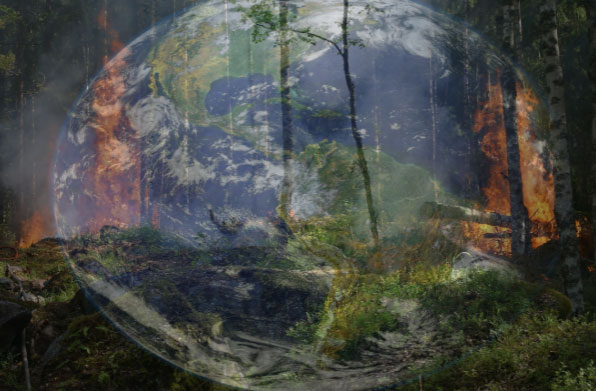Forest Fires Contribute to Climate Change

February 20, 2020
When we think of forest fires people often think about habitat and tree loss, but what most people don’t realize is that forest fires could be a tipping point in the effects of climate change.
The effects of these wildfires include the warming of our climate due to carbon emissions and loss of carbon sequestration. This warming is causing an increase in natural disasters, a rapid decrease in biodiversity, elevated sea levels, and the melting of glaciers and other ice forms. The warming of our climate also increases the chances of wildfires starting in many areas, so this cycle will continue if something is not done to decrease the conditions that lead to wildfires.
Carbon sequestration, or loss of trees, is the other major effect of mass wildfires. Two of the most recent mass wildfires were in the Amazon rainforest and the Australian bush. These two fires collectively released 1,040 million tons of Co2 into our atmosphere. This massive amount of carbon dioxide greatly affects our atmosphere and, paired with the immense loss of carbon sequestration, our atmosphere is really suffering.
While today’s media focuses on these two specific fires, they are not the only ones that pose a threat to our existence. There have been roughly 327,000 wildfires throughout the world from 2014 to 2018. These wildfires collectively burned roughly 36,000,000 acres of land, according to The National Interagency Fire Center.
Alongside contributing greatly to the effects of climate change, these fires also destroy entire ecosystems and decrease biodiversity. The fires in Australia are estimated to have driven more than 600 species to extinction and killed an estimated 1 billion individual animals, according to The New York Times.
Other drastic effects include water and air pollution from the smoke and ash produced by these fires. The Ontario Ministry of Health reports that this pollution can contaminate entire water sources with ash and that smoke in the air is known to cause health complications for people living in those areas, including asthma, COPD, bronchitis, pneumonia, and cardiovascular complications.
Although most of these fires are thousands of miles away, New Mexico is also vulnerable. The likelihood of mass wildfires has increased due to climate change, and because New Mexico has a dry climate and overall temperatures are rising, we are vulnerable to mass wildfires. In addition, the pollution produced by these fires affects the well-being of the entire world.

